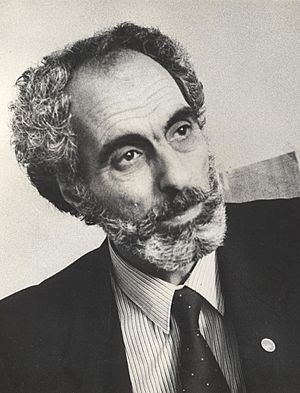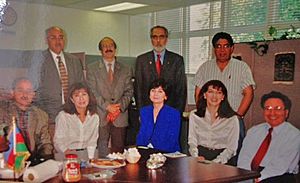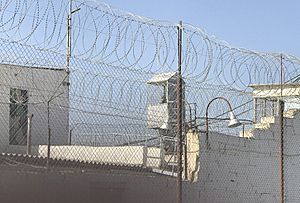Abulfaz Elchibey facts for kids
Quick facts for kids
Abulfaz Elchibey
Əbülfəz Elçibəy |
|
|---|---|

Elchibey in 1992
|
|
| 2nd President of Azerbaijan | |
| In office 17 June 1992 – 24 June 1993 |
|
| Prime Minister | Rahim Huseynov Ali Masimov Panah Huseynov |
| Preceded by | Isa Gambar (acting) |
| Succeeded by | Heydar Aliyev |
| Personal details | |
| Born | 24 June 1938 Kalaki, Ordubad District, Nakhichivan ASSR, Azerbaijan SSR, USSR |
| Died | 22 August 2000 (aged 62) Ankara, Turkey |
| Political party | Azerbaijan Popular Front |
| Spouse | Halima Aliyeva |
| Children | 2 |
| Signature | |
Abulfaz Elchibey (Azerbaijani: Əbülfəz Elçibəy; 24 June 1938 – 22 August 2000) was an important political leader in Azerbaijan. He was also known as a Soviet dissident, meaning he disagreed with the government. His real name was Abulfaz Gadirgulu oghlu Aliyev.
He took the name "Elçibəy," which means "noble messenger" in Azerbaijani. This happened when he became a leader of the Azerbaijani Popular Front in 1990. Elchibey served as the president of Azerbaijan from June 17, 1992, until he was removed from power on June 24, 1993. He believed in Pan-Turkism, which is the idea of uniting Turkic peoples. He also had strong anti-Iran views.
Contents
About Abulfaz Elchibey
Abulfaz Elchibey studied the Arabic language at Baku State University. He finished his studies in 1957. Later, he worked as a translator and taught history at the same university.
From 1963 to 1964, he worked as a translator in Egypt. He soon joined a group that wanted Azerbaijan to become independent again. He was held in prison from 1975 to 1976. After that, he worked at the Institute of Manuscripts of Azerbaijan. He wrote over 50 scientific papers about Eastern philosophy, history, literature, and religion.
Becoming President of Azerbaijan
How Elchibey Came to Power
Elchibey became president after Azerbaijan faced big challenges in the war over the Nagorno-Karabakh region. After some difficult events in early 1992, the leaders at the time could no longer stay in power.
There was a lot of confusion, and the Azerbaijani Popular Front took control in Baku in May 1992. National presidential elections were held on June 7, 1992. Elchibey won with 54% of the votes. He became Azerbaijan's first democratically elected president who was not a communist.
What He Did as President
Military and Security
In the summer of 1992, Elchibey made sure that all Soviet troops left Azerbaijan. This made Azerbaijan the first former Soviet republic (besides the Baltic states) to be free of Soviet military presence. His government also created the national Azeri Navy. They also agreed with Russia to receive part of the Soviet Caspian Flotilla.
Elchibey chose İsgandar Hamidov to be the Minister of Interior. Hamidov was a police colonel and a leader of the Grey Wolves movement. He resigned in April 1993 after the fall of Kelbajar.
The Karabakh Conflict
In June 1992, the Azerbaijani army started a counter-attack in Nagorno-Karabakh. By the fall of 1992, they controlled over 40% of the region. However, the fighting became very difficult. There were many casualties and losses of military equipment. The campaign eventually ended without success.
Azerbaijan's Foreign Relations
On August 18, 1992, Elchibey signed a document for Azerbaijan to join the International Monetary Fund and the International Bank for Reconstruction and Development. In September 1992, former British Prime Minister Margaret Thatcher visited Baku. She was a guest of Elchibey.
During her visit, an agreement was signed between Azerbaijan, British Petroleum, and Statoil. This agreement was for exploring the Chirag oilfield. Elchibey wanted to attract foreign businesses to Azerbaijan. He thanked Thatcher for her role in Azerbaijan gaining independence.
Relations with Turkey
In 1992, Elchibey visited Ankara, the capital of Turkey. He said he was a follower of Mustafa Kemal Atatürk, who founded modern Turkey. Elchibey also believed in Pan-Turkism, which meant he wanted closer ties among Turkic peoples. He had the support of the leader of Turkey's Nationalist Movement Party. In April 1993, he attended the funeral of Turkish President Turgut Özal, who shared similar beliefs about a possible Turkic union.
Relations with Russia
During Elchibey's time as president, relations between Azerbaijan and Russia became difficult. His policies were sometimes seen as "Anti-Russian." He often used an interpreter when speaking to Russian officials, even though he spoke Russian well. He sometimes teased Russian leaders. For example, he praised the Tatar President, calling the Tatar people "heroic." On September 12, 1992, he visited Moscow and signed a "Treaty on Friendship, Cooperation and Mutual Security" with Boris Yeltsin.
Relations with Iran
Elchibey was described as having strong "anti-Iranian" policies. This was partly because he saw an alliance between Iran and Armenia. Elchibey supported the idea of uniting Azerbaijan with the region known as Iranian Azerbaijan. This idea made the Iranian government in Tehran unhappy. During a visit to Turkey, he even called for the downfall of the Iranian Islamic Republic.
Relations with Other Countries
Elchibey visited Ukraine on November 12, 1992. He stated that Azerbaijan would prioritize its relations with Ukraine among the former Soviet republics.
Elchibey's Downfall
As rebellious troops moved towards Baku, President Elchibey invited Heydar Aliyev to Baku. Aliyev was a former Soviet leader and was then head of Nakhchivan. Aliyev quickly gained control. He became the Chairman of the Azerbaijani parliament on June 15, 1993.
Nine days later, Elchibey left for Nakhchivan. Aliyev, as the parliament speaker, then took over the presidential powers. He signed the Bishkek Protocol to stop the fighting. Aliyev then held a national vote on August 29, 1993. This vote officially removed Elchibey from the presidency. In another election on October 3, 1993, Heydar Aliyev was elected president of Azerbaijan.
Later Life and Death

Elchibey returned to Baku in 1997. He joined the opposition as the leader of the Azerbaijani Popular Front Party.
In 2000, Elchibey was diagnosed with prostate cancer. He passed away in August of that year in a hospital in Ankara, Turkey. His body was brought back to Baku. He was given a state funeral at the Alley of Honor, with President Heydar Aliyev attending.
The Elchibey Institute was created in Azerbaijan on November 17, 2020. Its goal is to promote the national ideas and policies of Elchibey.
See Also
 In Spanish: Abulfaz Elchibey para niños
In Spanish: Abulfaz Elchibey para niños
- President of Azerbaijan
- Politics of Azerbaijan
- National Assembly of Azerbaijan
- Foreign relations of Azerbaijan
- List of political parties in Azerbaijan
- Whole Azerbaijan
- Azerbaijan National Resistance Organization
 | Jackie Robinson |
 | Jack Johnson |
 | Althea Gibson |
 | Arthur Ashe |
 | Muhammad Ali |


